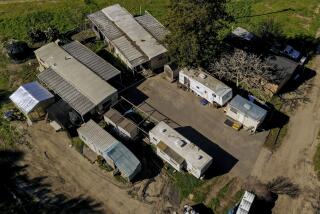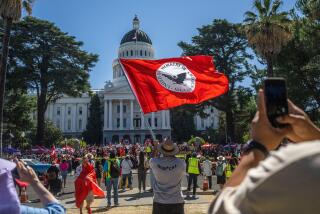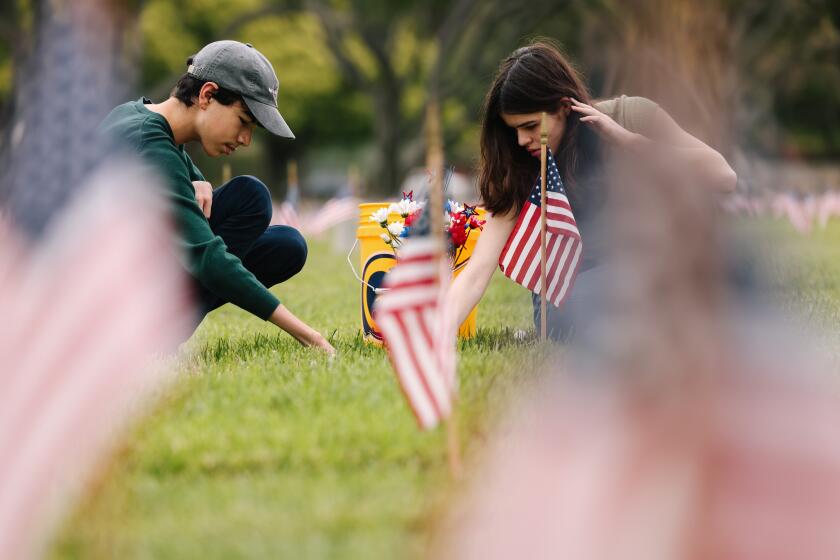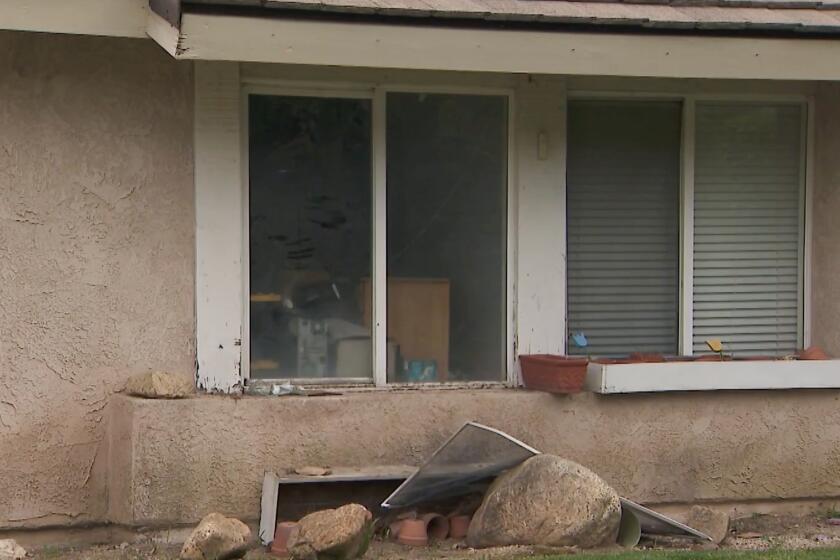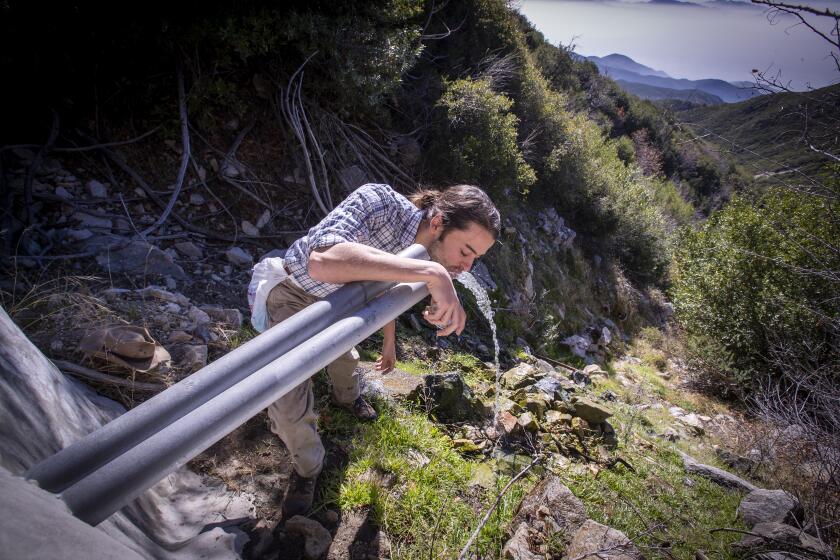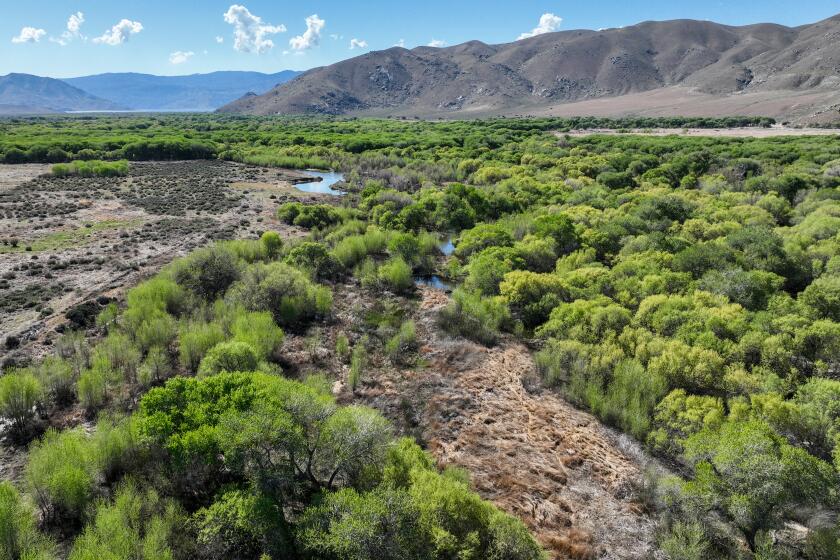Decision in Suit Against UFW Nears : Courts: Cesar Chavez testified in $9.7-million damage claim only hours before he died. Jury deliberations are scheduled to begin today.
The $9.7-million damage suit against the United Farm Workers that consumed Cesar Chavez’s final days is nearing a decision, with the union that he built facing possible bankruptcy and disarray if a jury sides with a major lettuce grower.
Union loyalists awaiting a verdict have held rallies outside the courthouse where Chavez completed a second day of grueling testimony just hours before he died April 22. Many are bitter that the suit by agribusiness giant Bruce Church Inc. went to trial at all and has gone forward despite Chavez’s death.
“Cesar died defending our rights,” Arturo Rodriguez, Chavez’s son-in-law and successor as president of the union, said at a rally. “He only had to be here because of the false accusations against us. Cesar’s spirit is here with us. We won’t let him down.”
A Yuma County Superior Court jury is set to begin deliberations today in the retrial of the lawsuit brought by Church, a Salinas-based grower with massive acreage in California and Arizona, over a UFW boycott of the company’s Red Coach brand lettuce.
The company alleges that in pursuit of the boycott the union illegally threatened to link grocery chains that sold the lettuce with sexual harassment, child abuse and misuse of toxic chemicals.
An earlier Yuma jury, after hearing almost identical evidence, found in favor of the grower in 1988 and set damages against the union at $5.4 million. But an appellate court ordered a retrial after invalidating one of two pro-business Arizona laws that formed the original basis of the grower’s allegations.
The trial resumed two weeks after Chavez’s death. The judge denied a motion for a mistrial from UFW attorneys who said they were unable to question Chavez.
Sensing that the case was being lost, and with it the union’s chance to regain some of the membership, contracts and influence it lost during the 1980s, the union changed tactics in recent weeks.
Michael Aguirre, a former federal prosecutor and now a high-profile litigator from San Diego, was brought in to finish the case and make closing arguments to the jury.
The media, sympathetic priests and celebrity friends of the union were encouraged to attend the trial. Actors Martin Sheen and Susan Anspach came to show support, and a television station sought permission to bring a camera to court, a request that Judge Joseph D. Howe denied.
Howe has voiced displeasure with the UFW stratagem of packing the 128-seat courtroom with supporters, many of them wearing T-shirts and buttons extolling Chavez and the union.
One T-shirt shows a picture of Chavez and the words: “Cesar Estrada Chavez: March 31, 1927-April 22, 1993. Si Se Puede, “ which translates to, “Yes, You Can,” a Chavez motto.
Howe said that packing the courtroom was an example of “extrinsic pressure on the jury” to influence the verdict. “There are pressures and it is my job to prevent them,” Howe said. “This case should not be decided on sympathy.”
On Monday, Presiding Judge H. Stewart Bradshaw, who heard the first trial and was roundly criticized by the UFW for directing a verdict in favor of Church, ordered the retrial’s final days moved from the larger courtroom to one with only 32 seats.
Aguirre, who has had a number of sharp exchanges with Howe and unsuccessfully sought his removal for alleged bias, argued in court that sending the trial to a smaller courtroom could influence the jury in favor of Bruce Church Inc.
“If you do this,” Aguirre said, “you will send a message to the jury that the UFW has done something wrong” by bringing supporters to watch the trial.
Howe, who supported the move to a smaller room, responded that “there is a need for crowd control. We have had trouble getting our jury in and out.”
On Tuesday afternoon, Howe ruled that today’s closing arguments would return to the larger courtroom and that a TV camera would be allowed to tape the session. But he barred the crowd from mingling with jurors in the courthouse.
Some of the emotion swirling about the case involves land 15 miles outside Yuma where the Chavez family had lived when he was a child. Lost through foreclosure during the Depression, the land is owned by Church.
Since Monday night, a 24-hour vigil has been under way on the lawn outside the courtroom, featuring a Mass and rosary by a Roman Catholic priest, folk songs, large portraits of Chavez and appearances by elected officials from throughout Arizona.
“This trial isn’t about justice,” said Los Angeles attorney Rees Lloyd, one of several attorneys working pro bono for the union. “This is an attempt to crush Cesar Chavez’s union and make sure it never recovers.”
UFW supporters worry that a new jury award in favor of Church would force the union to direct its time and efforts into filing exhaustive appeals, just when it hopes to revive its organizing efforts. The union has assets of about $2 million and could be devastated, UFW officials said.
Chavez, sensing that growers were unmovable in the 1980s, turned from field organizing and adopted the tactic of “high-tech boycotts” against grocery chains--using targeted mail to consumers, demographic studies, focus groups and fund raising by mail--hoping to force large growers such as Church to sign UFW contracts.
The UFW campaign sought to persuade grocery stores that by dropping Church lettuce they could avoid the negative publicity of being associated with mistreatment the UFW alleges that Church inflicted on its workers, including sexual harassment, exposure to toxics and hiring minors.
Faced with picketing and letters to their customers, 10 grocery chains dumped Church lettuce, including the Lucky Stores Inc. chain in early 1984. In the years since Church filed suit, all but Lucky have resumed buying Church lettuce.
By suing in Arizona, the company was able to invoke an Arizona law that prohibits a “secondary boycott” launched against the grocery chains by the UFW in an effort to bring Church to the bargaining table. California law allows such boycotts.
In overturning the 1988 verdict, the state appeals court rejected the use of Arizona’s law banning secondary boycotts for cases where the boycott did not occur in Arizona.
More to Read
Start your day right
Sign up for Essential California for news, features and recommendations from the L.A. Times and beyond in your inbox six days a week.
You may occasionally receive promotional content from the Los Angeles Times.
